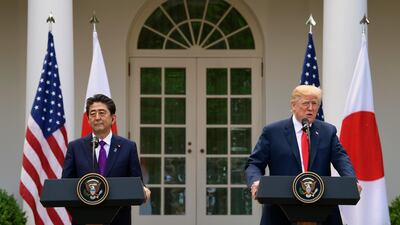US President Donald Trump on Thursday held out the prospect of inviting North Korean leader Kim Jong Un to the White House if he deemed next week's summit a success while also signaling he was willing to walk away if he thought talks did not go well.
At a White House news conference with Japanese Prime Minister Shinzo Abe, Mr Trump also repeated what he said last week that it was possible he and Mr Kim could sign an agreement to end the 1950-53 Korean War, which was concluded only with a truce, not a peace treaty.
"We could sign an agreement, as you know that would be a first step ... We're looking at it, we're talking about it with a lot of other people," Mr Trump told reporters. "That's probably the easy part. The hard part remains after that."
Mr Trump added that he hoped someday U.S. relations with Kim's secretive Pyongyang government could be normalized.
The main issue for the June 12 summit in Singapore is the US demand for North Korea to abandon a nuclear weapons program that now threatens the United States.
North Korea has rejected giving up its arsenal unilaterally and defends its nuclear and missile programs as a deterrent against what it sees as U.S. aggression. The United States stations 28,500 troops in South Korea, a legacy of the Korean War.
U.S. Secretary of State Mike Pompeo on Thursday reemphasized Washington's stance going into the talks.
Mr Pompeo said Mr Trump will reject anything short of "complete, verifiable and irreversible denuclearization of the Korean Peninsula.
"President Trump is hopeful. But he's also going into the summit with his eyes wide open," Mr Pompeo said at a White House briefing after the Trump-Abe news conference.
Mr Pompeo, however, added that the U.S. would work to guarantee North Korea's security should it denuclearize. Trump "is prepared to ensure a DPRK free of its weapons of mass destruction is also a secure North Korea," Pompeo said.
_________
Read more
First Trump-Kim meeting scheduled for June 12
Seoul keeps an eye on North Korea's unusual 'military reshuffle'
_________
Mr Pompeo plans to stay in the region following the summit to meet with officials from Japan and South Korea and to travel to China, an important North Korean ally, to discuss the next steps involving Pyongyang.
Mr Trump told reporters on Thursday he would quit the talks if he felt he must, and would ramp up U.S. sanctions pressure on North Korea if the talks did not go well.
"I am totally prepared to walk away," he said.
On the other hand, Mr Trump said he might extend an invitation to Kim to Washington.
"Certainly if it goes well. I think it would be well received," he said in answer to a question. "I think he would look at it very favorably so I think that could happen."
Mr Pompeo, who has twice met with Kim in Pyongyang, said he believes the North Korean leader is prepared to take "bold" steps to alter the course of his nation.
"He has indicated to me personally that he is prepared to denuclearize," Mr Pompeo said. "That he understands that the current model doesn't work, that he's prepared to denuclearize and that two, he understands that we can't do it the way we've done it before. That is has to be big and bold and we have to agree to making major changes."
Asked whether the two sides had narrowed their differences on how they defined denuclearization, Mr Pompeo said they had, but he declined to give details.
US officials said Mr Kim had indicated he was willing to make a pledge to denuclearize, but had never made it clear if this would mean simply halting development of the weapons program where it stands or also disposing of its existing nuclear arsenal.
The officials, who spoke on condition of anonymity, said they expect that the Singapore summit will yield nothing more than a vague "end of war declaration" and leave the main issues on defining denuclearization for further negotiations.
North Korea has argued for a "phased" approach to denuclearization of the entire Korean peninsula, which in the past has also meant removal of the U.S. nuclear umbrella protecting Washington's allies South Korea and Japan.
At the meeting with Mr Abe, Mr Trump said he promised to raise with Mr Kim the subject of Japanese citizens abducted by North Korea, after Mr Abe focused on the issue during an earlier conversation.
"He talked about it long and hard and passionately and I will follow his wishes and we will be discussing that with North Korea absolutely, absolutely," Mr Trump said.

